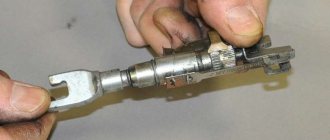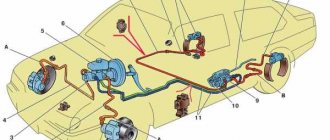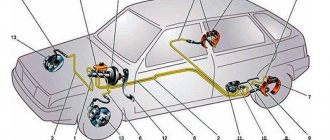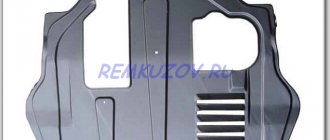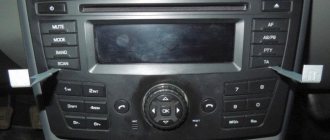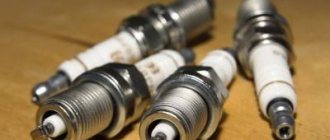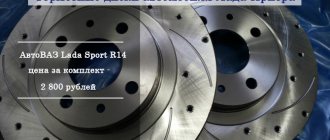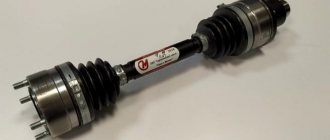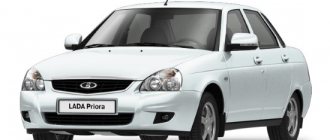Today the market offers a wide selection of different brake discs, not only for foreign cars, but also for Russian cars. What is the difference between regular brake discs and drilled brake discs? Is it worth installing such wheels on a VAZ 2110?
Brake disc overview
- 8 valve VAZ 2110 are equipped with R13 brake discs
- 16 valve VAZ 2110 are equipped with R14 brake discs
R14 brake discs cannot be installed on 13th radius car wheels. Minimum permissible thickness of brake discs:
- For ventilated 17.8 mm
- For non-ventilated 10.8 mm
Brake discs are distinguished:
- Ventilated discs
- With gas outlets
- With perforation or grooves (slots)
- Collapsible
Let's look at each point in more detail. The first option is ventilated discs. They are two separate disks, fastened together in such a way that they resemble blades (like a turbine). Thanks to these blades and channels, heat is dissipated more efficiently and the weight of the disc is reduced. An example of simple ventilated brake discs. During active braking, if the brake discs are not cooled enough, their temperature can reach 180-250 degrees. Regular pads start to smoke. The gas released when the pads rub against the heated disc serves as a layer between the disc and the pad and prevents the pads from fitting tightly to the brake disc. This is the main problem why braking disappears. To prevent such cases, there are gas outlets, perforations and grooves. An example of brake discs with gas outlets. Another reason for brake failure can be carbon deposits on the pads, which appears during frequent braking (on a race track). This carbon deposit turns the block into a slippery ski. Gas outlets and perforations cut off this slippery layer, renewing the pad. But they make the brake pads wear out faster. Example of brake discs with perforations and grooves. In addition, perforations together with grooves help remove water, dirt, and dust, which reduces the risk of scratching the brake disc. They also increase additional braking force and reduce disc wear. An example of brake discs with gas outlets and perforations. The fourth option is collapsible disks. As we already know, when braking, the brake discs heat up and the heat is transferred to the hub, and at high temperatures this unit is likely to fail. This is why some companies offer collapsible brake discs. They are a working disk, which is bolted to the middle part, which is attached to the hub. An example of dismountable brake discs. Because The majority of car owners operate their cars on city roads, and not on ring tracks and races, then the effectiveness of standard brakes will be sufficient. If you still want to improve the braking system of your car, then you should not install rear disc brakes, but simply change the brake discs to a larger diameter and install brake discs with perforations. You will feel the difference immediately, not only in braking, but also in the appearance of your car (for example, by illuminating perforated wheels with LEDs).
